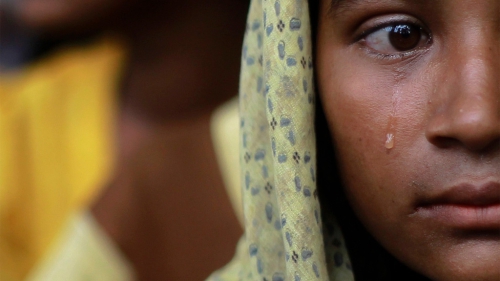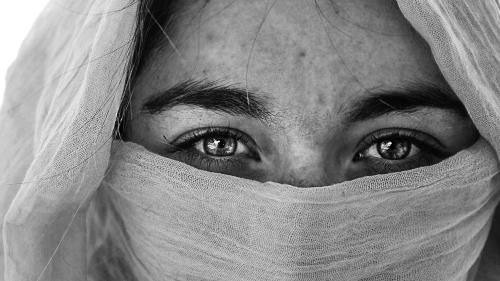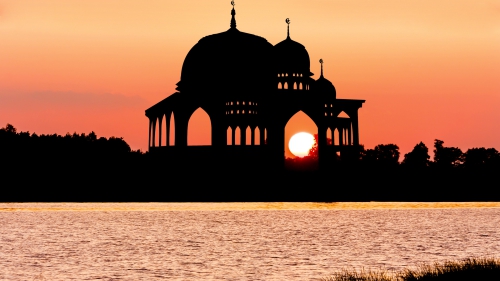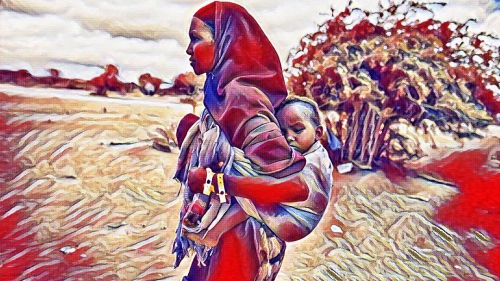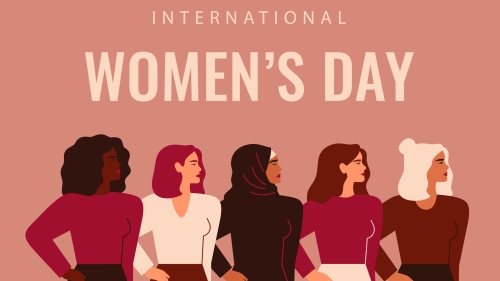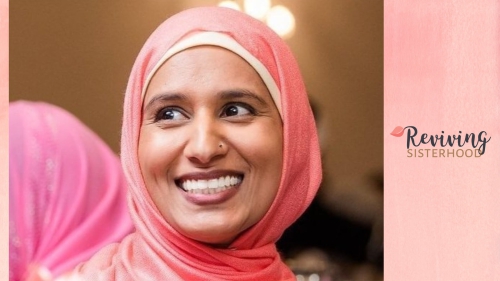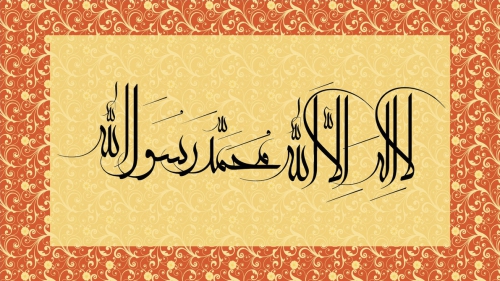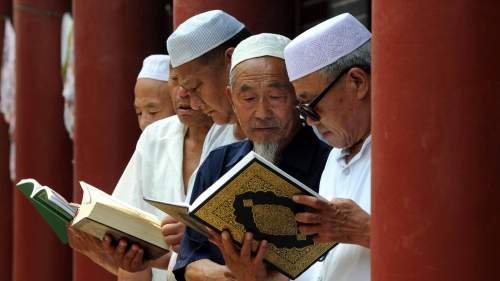Muslim Women Scholars Must Bloom Again
 |
Ever since becoming conscious about Islam on one hand and the contemporary social reality on the other, I have often been disturbed by realizing that, in many aspects, there is a huge gap between what Islam stands for and what the social reality is. A vital area where this gap is so pronounced is gender issues. After tying the knot with my beloved wife and then joining the parents club through two most wonderful daughters, I was compelled to take a much closer look at gender issues.
I have remained keen over the years to learn more about these issues. However, I have been increasingly dissatisfied as I continued to discover directly from the Qur'an, Qur'anic literature, Hadith, Seerah and history that what we are generally adhering to, and traditionally defending and promoting in regard to gender issues stands in sharp contrast to the Qur'anic and Prophetic vision as well as the heritage.
There is a general notion among the religious establishment of Islam, and derived there from, among the common Muslims, that Islam recognizes superiority of men over women. Even in Sayyid Abul Ala Maudoodi's well-known and highly respected Urdu commentary, Tafhimul Qur'an, verse 4 of Surah an-Nisa erroneously got translated into English as following: "Men are superior to women ... not in the sense that they are above them in honor and excellence..." [Tr. by Ch. Muhammad Akbar, Islamic Publications, Lahore, 1997 ed.; Vol. 1, p. 121; note: a more recent translation from Islamic Foundation, UK has a different rendering]. Even though some qualifier and clarifier have been added in the preceding rendering, the very expression, "men are superior to women" - in whatever sense it may be - is questionable, because if honor and excellence are excluded from the scope of "superiority," what exactly is the meaning and basis of superiority or excellence then?
Indeed, completely discounting birth-related distinctions, he commented on verse 13 of Surah al-Hujurat: "... In that (Islamic) society there is no distinction based on color, race, language, or nationality. ..." One should be impressed by Maulana Maudoodi's articulation as to the sweeping implication of the verse that destroyed the foundation of any other concept of superiority/excellence. However, is it not proper to include gender in that list, too? Once again, unless we are willing to accept the implication that this Qur'anic declaration (49:13) - Verily the most honored of you in the sight of God is (the person who is) the most God-conscious. - applies to males only, it is only Islamic that Maulana Maudoodi's comment should have read, inclusive of gender, as following: "... In that society there is no distinction based on color, race, language, nationality or gender. ..."
Muslims routinely take the position that Islam does not recognize any unfair distinction based on color, race, language, or nationality. Unfortunately, however, even in this age of gender consciousness, we are failing to uphold and present Islam in consonance with the full scope of the Qur'anic vision and the Prophetic heritage.
Not too long ago, a friend of mine from Los Angeles, California (teaching at a university there) called me and among other things, lamented the fact that his otherwise devoted Muslim family is finding a difficult time to have rooms assigned for them in Masjid with appropriate or adequate ventilation. Might a little bit of natural light and wind be hazardous to our women's as well as our spiritual health and well-being?
There are many Muslim countries where women going out for their regular needs find little or no facility for women to wash and pray. Several years ago I participated in the Shura (consultative) committee of one of the Islamic Centers in USA. By the vote of the community, the elected chairman of the Shura was joined by his wife (also elected as a member) in the Shura as well. At the very first meeting, one of the brothers - who must have felt that the presence of the sister, even with her husband present, was a violation of Islam - to protect his own piety and lodge his silent but otherwise conspicuous protest, stood up and left.
Several years ago, I visited a Masjid in one of the Midwestern states in USA, where I found the facilities for washing for men was not that good but survivable. However, due to neglect or poor maintenance, whatever might be, my young daughter, going around by herself into the women's section, later on, came out crying at what she experienced there. A non-Muslim woman in one of the places of America was refused the taxi-service by a Muslim driver because she had a dog with him. It did not matter that she was blind. The brother, feeling duty bound (?), offered a prodigious lecture to this blind, non-Muslim lady. Although there are many examples to the contrary, there are some disturbing patterns that Muslims themselves should be confronting and scrutinizing in a self-critical and proactive manner.
The literacy rate is already poor in the Muslim countries and the rate for women is disproportionately lower. Let us not talk about the poor women in various countries who are without any protection and whose life, honor and property are anybody's game. Women were robbed of their professional and out-of-the home positions under strict public code in Taliban's "Islamic" Republic of Afghanistan. In contrast, Muslim women in Iran are doing relatively a lot better, but the top-tier religious hierarchy is still a drag on the society's overall progress. In the heartland of Islam with Makkah and Madina, controlled by a externally-installed dynasty and dominated by Wahhabism, women don't have the right to drive. It is so ironic and outrageous, because the sacred city of Makkah was founded through the valiant and exemplary struggle and sacrifice of a lone woman, Hajera, the wife of Ibrahim and the mother of Ismail (a). Yet, now a woman does not have the right to drive by herself.
More seriously, quite often we hear about women being meted out capital punishment for illicit sexual relations. Usually, women bear the brunt of the orthodox Shariah codes, even though we all know that even when raped, women, for a multitude of reasons, can't be so easily expected to step up and claim to have been raped. In many countries, women are routinely deprived of their property and inheritance. As personal and family matters, women rarely can secure their rights even from their relatives. In many Muslim countries, women are routinely subjected to physical violence, often lethally, which is condoned or tolerated by the broader society as personal or family matter. Vulnerable women are routinely married to be added to a husband's collection and also divorced at random as it pleases the husbands. The existing laws, values, customs and power structures - in combination - make and keep women weak, vulnerable, marginalized, and even oppressed.
Of course, women are completely absent from the pertinent discourse to shape and reshape the Islamic laws and codes. Islamic movements in various parts of the world are chanting about the progress they have made in promoting the cause of the women in accordance with Islam and vainly arguing how Islam is rightfully superior in dealing with women's rights. As they are still groping with the issues whether women should veil themselves (i.e., use niqab, face-covering), they have no problem with men playing games, such as soccer, with albeit "longer" shorts! In some Muslim countries, leading Islamic parties still stubbornly insist that women must cover their face as well. They might be super-lenient in regard to interpreting Islam in matters of political expediency, but regarding women's issues they have to be most extremely conservative. Many such organizations are also promoting separate women's educational institutions as well as separate women's organizations for Islamic causes. At the same time, Islamic parties in many Muslim countries remain at bay without broad support, especially from women, while they have to contend with challenges from many home-grown, viciously anti-Islamic feminists. Indeed, a whole new generation of men and women is growing up with the entrenched impression - and even conviction - that Islam is seriously biased in terms of gender issues. These are Islamic MOVEments that seem rather unable to MOVE in a contemporary context.
I should clarify that my arguments and opinions herein are to be applicable within the context of Islam. For example, when I am referring to the insistence by Jamaat-e-Islami in Bangladesh on veiling of women, it is because I consider this veiling (face-covering) Islamically unwarranted and the insistence unacceptable. Such position is based on extreme conservatism, especially when it comes to gender issues. Let me raise some further questions now. Are men really superior to women according to Islam? Why don't we have women Islamic scholars, experts, and Mujtahids (jurisprudents)? To solve the problems of women, do we need, or is it Islamic, to have separate Islamic schools/colleges/mosques? Is it alright for women to give lectures to a mixed gathering of Muslim men and women? How about doing so at Islamic Centers/mosques?
I hope that I have not already rung too many alarm bells. Based on my study of the Qur'an, Hadith, Seerah and history, I have concluded quite a while ago that what we are promoting, both by saying and doing, today are mostly opposite to what Islam teaches. Then, several years ago it was by chance I came across a book Struggling to Surrender by a new American Muslim, Dr. Jeffrey Lang. The book was captivating. But apart from its richness in terms of the experience he frankly shared and thoughts he provoked, it was an important eye-opening experience for me in regard to gender issues. We are generally aware that Muslim women, such as Hadhrat Aishah, Fatima, Khadija (r), and others, have played distinguished role during and immediately after the Prophet (s). In that book, there were some brief references to a forgotten, but very distinctive role Muslim women have played in Islamic history.
My interest was deeply aroused. I followed up by reading the original reference, Hadith Literature: Its Origin, Development, Special Features & Criticism by Dr. Muhammad Zubayr Siddiqi, a late scholar from Calcutta University [Cambridge: The Islamic Texts Society, 1993]. This book had a chapter titled "Women Scholars of Hadith," [pp. 117-123] which was an eye-opener for me.
For the first time I realized one of the most basic defects in our contemporary Muslim attitude and thinking in regard to gender issues. We all know that beyond the few towering women personalities in the earliest part of the Prophetic era, we can hardly name any woman scholar. It is well-known that in our contemporary century, Islamic scholars, Imams, experts, as well as leaders of Islamic movements, have not been educated by men and women. Going back further, even noted scholars such as Shah Waliullah Dehlavi and Shaikh Ahmad of Sarhind, popularly known as Mujaddid Alf Sani did not (correct me, if I am wrong) have any woman among their educators. It was simply not possible, because "women scholars" of Islam - teaching men and women, in public context, where many of them were, overall the best of the best of their time, not just among women - have become an extinct species.
What am I saying? Learning of Islam by men from men AND women? Tell me, isn't it true that the founder of Tabligh Jamaat (Maulana Muhammad Ilyas), founder of Ikhwan al-Muslimoon ( Shaikh Hasan al-Banna), Saudi Arabia's late chief Mufti Shaikh Ibn Bazz, or even the founder of Jamaate Islami (Sayyid Abul Ala Maudoodi) did not have among their educators any contemporary women scholar? How many of us have ever heard or known that there were times spanning many centuries when top male Islamic scholars sometimes used to recommend their mixed groups of students, men and women, to learn a particular text such as Sahih al-Bukhari or Sahih Muslim from none other than some specific woman scholar? If we have not, the attitude of these generations of Muslims, including their leaders, scholars, mentors, vis--vis women, can be better understood.
The role of women scholars of hadith is unique in the human history, prior to our modern times. There is simply no parallel to this special and valuable role played by women scholars in the development, preservation and dissemination of Islamic knowledge. In the words of Dr. Zubayr Siddiqi, "History records few scholarly enterprises, at least before modern times, in which women have played an important and active role side by side with men. The science of hadith forms an outstanding exception in this respect. ... Islam produced a large number of outstanding female scholars, on whose testimony and sound judgment much of the edifice of Islam depends. ... Since Islam's earliest days, women had been taking a prominent part in the preservation and cultivation of hadith, and this function continued down the centuries. At every period in Muslim history, there lived numerous eminent women-traditionists, treated by their brethren with reverence and respect." [p. 117]
Muslims are generally familiar with a handful of female luminaries from the time of the Prophet. However, what they are generally unfamiliar with is a large number of women scholars over many centuries after the first generation. This is an unforgivable lapse for the Ummah.
Just to mention a few, hopefully, would spark our interest in learning about this neglected dimension of our remarkable history. Do we know that Umm al-Darda (d. 81/700) was regarded by some of her contemporary leading male traditionists as "superior to all the other traditionists of the period, including the celebrated masters of hadith like al-Hasan al-Basri and Ibn Sirin." 'Amra was specially recognized for her authority on traditions related by A'isha and among her many notable students was Abu Bakr ibn Hazm, the celebrated judge of Medina, who was ordered by none other than the caliph Umar ibn Abd al-Aziz himself to write down all the traditions known on her authority. [p. 118]
Zaynab bint Sulayman (d. 142/759) "gained a reputation as one of the most distinguished women traditionists of the time, and counted many important men among her pupils." [p. 118] Almost without any exception, the compilers of major collections of hadith also lists a good number of women traditionists and scholars as their teachers. "A survey of the texts reveals that all the important compilers of traditions from the earliest period received many of them from women shuyukh: every major collection gives the names of many women as the immediate authorities of the author. And when these works had been compiled, the women traditionists themselves mastered them, and delivered lectures to large classes of pupils, to whom they would issue their own ijazas." [pp. 118-119]
It is so unfortunate and ironic that now this hadith literature in particular is used to suppress and deny the role, rights and status of women and confine them to the corners of our households. During the fourth century, there were women scholars, whose classes were always attended by many other scholars of great repute. Karima al-Marwaziyya (d. 463/1070), is one of those names that we should proudly know and remember, "who was considered the best authority on the Sahih of al-Bukhari in her own time. Abu Dharr of Herat, one of the leading scholars of the period, attached such great importance to her authority that he advised his students to study the Sahih under no one else, because of the quality of her scholarship." Among her students were al-Khatib al-Baghdadi, a noted Islamic scholar and historian. [p. 119]
Fatima bint Muhammad (d.539/1144) received from her contemporary hadith specialists "the proud tittle of Musnida Isfahan (the great hadith authority of Isfahan)." Shuhda 'the Writer' (d.574/1178) "was a famous calligrapher and a traditionist of great repute ... Her lectures on Sahih al-Bukhari and other hadith collections were attended by large crowds of students; and on account of her great reputation, some people even falsely claimed to have been her disciples. [p. 119]
Sitt al-Wuzara became well-known as an authority on Bukhari. Her acclaimed mastery included Islamic law as well. Crowned as 'the musnida of her time', she delivered public lectures on the Sahih and other works in Damascus and Egypt. [p. 120]
In fourteenth century, Zaynab bint Ahmad (d.740/1339) used to deliver public lectures the Musnad of Abu Hanifa, the Shamail of al-Tirmidhi, and the Sharh Ma'ani al-Athar of al-Tahawi. Do we remember the great traveler Ibn Battuta? He studied hadith with her and various other women during his stay at Damascus. [p. 120]
Learning was by both men and women. So was teaching, and the environment definitely was not a segregated one, where the learning as well as teaching took place. There were hardly any notable men during those centuries who did not receive teaching from women scholars as well. Furthermore, it was not just one or a few isolated cases. But there were a large number of women whose contribution to the field of learning and teaching remains an honored tradition that we may have altogether forgotten and neglected. Worse; many of us become vehemently opposed to it.
The famous historian of Damascus, Ibn Asakir, studied under more than 1,200 men and 80 women. He obtained the special ijaza of Zaynab bint Abd al-Rahman for the Muwatta of Imam Malik. The famous Qur'anic commentator Jalal al-Din al-Suyuti studied the Risala of Imam Shafii with Hajar bint Muhammad. Zaynab bint al-Sha'ri (d.524/615-1129/1218) studied hadith under several important traditionists, and in turn taught many students - "some of who gained great repute - including Ibn Khallikan, author of the well-known biographical dictionary Wafayat al-Ayan." [pp. 120-121]
Further account of the women scholars' contribution can be found in the works of Ibn Hajar, the author of the most important commentary on Sahih al-Bukhari. In one of his works, he provides short biographical accounts of no less than about 170 prominent women of the eighth century. Most of them were hadith scholars and under many of whom the author himself had studied. According to him, some of these women were acknowledged as the best traditionists of the period. For example, Juwayriya bint Ahmad, studied a range of works on traditions, under scholars both male and female. She then taught at the great colleges of the time, and then offered famous lectures on various Islamic disciplines, which used to attract an audience of high reputes. Some of Ibn Hajar's own teachers and many of his contemporaries attended her discourses. Another teacher of him was A'isha bin Abd al-Hadi (723-816). She was regarded as the finest traditionist of her time. Students from diverse backgrounds used to travel long distances "in order to sit at her feet and study the truths of religion." [p. 121]
In a book al-Daw al-Lami, biographical dictionary of eminent persons of the ninth century, Muhammad ibn Abd al-Rahman al-Sakhawi (830-897/1427-1489) provides information about the great women scholars of that period. In another book, Mu'jam al-Shuyukh, Abd al-Aziz ibn Umar ibn Fahd (812-871/1409-1466), provides biographical notes about "1,100 of the author's teachers, including over 130 women scholars under whom he had studied." Many of these women scholars were of the highest repute and trained many of the great scholars of the following generation. [p. 121]
There were women scholars whose field of expertise went far beyond hadith. "Umm Hani Maryam (778-871/1376-1466), for instance, learnt the Qur'an by heart when still a child, acquired all the Islamic sciences then being taught, including theology, law, history, and grammar, and then traveled to pursue hadith with the best traditionists of her time in Cairo and Mecca. ... She pursued an intensive program of learning in the great college of Cairo, giving ijazas to many scholars, Ibn Fahd himself studied several technical works on hadith under her." [pp. 121-122]
A'isha bin Ibrahim (760/1358-842/1438) studied traditions in Damascus and Cairo, and "delivered lectures which eminent scholars of the day spared no efforts to attend." [p. 122]
For various reasons that should be subject of a serious study, the "involvement of women in hadith scholarships, and in the Islamic disciplines generally, seems to have declined considerably from the tenth century of the hijra." [p. 122] There are several other biographical dictionaries that list names of women scholars of the subsequent period, but in vastly reduced numbers. Yet, as part of an endangered group, there were women who continued their valuable contribution. Asma bint Kamal al-Din (d.904/1498) wielded great public influence. She delivered public lectures on hadith, and trained women in various Islamic sciences. A'isha bint Muhammad (d.906/1500) taught hadith to many students. She was a professor at the Salihiyya College in Damascus. [p. 122]
The last known woman traditionist of the first rank, Fatima al-Fudayliya, also known as al-Shaykha al-Fudayliya, settled at Mecca. She founded a rich public library there. "In the Holy City she was attended by many eminent traditionists, who attended her lectures and received certificates from her." [p. 123]
History records that these women scholars "took their seats as students as well as teachers in pubic educational institutions, side by side with their brothers in faith. The colophons of many manuscripts show them both as students attending large general classes, and also as teachers, delivering regular courses of lectures." These were NOT gender-wise segregated institutions either. "[O]n folio 250, we discover that a famous woman traditionist, Umm Abd Allah, delivered a course of five lectures on the book to a mixed class of more than fifty students, at Damascus in the year 837/1433." [p. 123]
Although one can't draw a superficial connection between the decline of the Islamic civilization and the gradual disappearance of the women scholarship and participation, the reality is that our collective foundation of knowledge and heritage is based on the proud and noble contribution of scholarship of both men and women, as students and teachers, side by side, and there must have been substantive consequence from this loss of women scholarship.
The conditions of the Muslim world in general, and that of Muslim women in particular, stand in sharp contrast with the Islamic vision and heritage that continued through many centuries after the Prophet. Today, Muslim women are rarely welcome in the public life and especially in the mosque, let alone being part of our pool of educators, experts and mentors. This has created serious disenchantment among the women in the Muslim world, and turned some of them into bitter opponent to religion in general and Islam in particular. The existing conditions are a clear perversion of Islamic teachings and guidance. The absence of women scholars has also caused a great imbalance in our Islamic discourse in general and Islamic law (fiqh) in particular, by leaning toward the most extremely restrictive positions, opinions and provisions for the women.
In our contemporary time, there are Muslim women, particularly educated in the West or in the western tradition, who are establishing themselves as scholars of Islam. This is a very encouraging development. They are making critical contributions toward a new legacy of quality scholarship, especially in the field of gender issues. However, their emergence is not internal to Islam, and the broader Muslim society is yet to embrace them as part of the religious establishment, toward which they turn for religious scholarship. Of course, the religious establishment continues its orthodox resistance against such development of women scholarship and participation to protect their traditional turf.
In order to adequately empower women from the Islamic perspective, women need to equally and fully participate in our society, beginning with education and scholarship. The principle of Shura (mutual consultation) requires that those whose lives are affected by various decisions/opinions of Islamic laws and dictates ought to be full participants in the pertinent discourse. Women need to take interest in and men come forward to facilitate women's development in the field of education and scholarship. Muslim men need to demand such changes, as our Islamic pursuit for positive change can't be either complete or balanced without women being our full and equal partners. We need to cherish an environment where Muslim men, side by side with women, can engage in Islamic education and discourse, as students as well as teachers. We need women in all fields of Islamic and other studies, where men must excel in a competitive environment. We need to take this pursuit seriously, until we have qualified Islamic jurisprudents (mujtahids) and scholars among women, side by side with men, whose joint input would reshape our Islamic discourse and laws.
This does require no less than a revolutionary change, but it is an Islamic must. It is like turning Islam in our lives downside up, because Islam as we understand and practice it has been turned upside down. Muslims need to coalesce together to revive this glorious tradition of women's scholarship. Without them, our society would be fundamentally deficient and imbalanced, which will be reflected in all walks of our lives. That is why we again need women scholars back: THEY MUST BLOOM AGAIN.
[The author is an associate professor of economics and finance at Upper Iowa University. Homepage: http://www.globalwebpost.com/farooqm; email: [email protected].]
Related Suggestions
Men and Women are equal in the sight of Allah in dignity and respect. However, men has been given the responsiblity of providing for the family by the creator of the heavens and the earth in His infinite wisdom. This is nothing to do with the equality or inequality in earthly sense. It is to do with the assignment of responsibility. Women bear the child in her womb while men do not, is this inequality? My brother, please don't make things any more confusing then what it already is by the negative propaganda of the west and it's total hatred for Islam.
The suffering of the women in different countries in the hands of tyrant government, unstable countries (mostly by foreign intervention) or uneducated population is no different than the women suffering in the most socalled advanced countries by way of physical and sexual abuse. US is yet to show a women president. By the way, in Bangladesh (85% muslim), both the government and the opposition leaders are female. Ayeasha (ra) provided us with almost 10,000 narrations of hadiths. This is no news to a Muslim. I am amazed that Dr Omar an educated person hearing about muslim women scholars now finds it "eye opening" for him at his age. Islam encourages all scholars men or women. Surely women can lecture in a gathering while in proper dress code. Islam does not permit unnecessary free mixing. However, in times of necessesity, women surely can participate side by side with other men. Co-education is not necessary if you can afford it. Dr. Omar surely is aware of plight of western family plagues with broken houses, divorces, child abuse and what not. I suggest he studies the works of learned scholars and preach proper Islam and avoid pointing out exceptions as being the real Islam.
May Allah guide us all closer to the truth.
The author seems to make the all too common mistake of equating the history of 'Muslim' countries with the actual teaching of Islam. According to my own interpretation of Islam as communicated by the Prophet (saas), women are part of the society and should be treated with the utmost respect. However men are given the authority to govern the society and inappropiate mixing of the sexes will only lead in one direction- social turmoil caused by adultery, family strife and the rest. While the author talks sense by saying that there should be female scholars and female opinions, he seems to think that Muslim male-female relationships should be carried on in the same fashion as occurs in most countries. The exception is that instead of clean shaven faces and short skirts, there will be veils and beards. Is this really in line with the sunna or is it an attempt by the author to appease the crusaders of liberalism? Remember- men and women exist for one reason. That is to serve Allah, not to milk the global cow for all it is worth. Basically men have more rights, because they have more responsibilities, women have less rights because they have less responsibilities. Please Mr. Author, stop pandering to the liberal blitzkrieg and teach the straight teaching of Islam,
As Salamu wa alaikum.
We should support women's rights, education and not discriminate them in mosques they have a right to pray to Allah whether in their homes or mosques. We should provide equal facilities in places of worship and school.We should do all this keeping in mind that we do not trangress or go against Sunna of the prophet and teachings of the Quran.Sometimes men have no time to educate their children about Islam and this falls on the woman's shoulder. A woman should be well equipped to teach, correct her children, husband, islamic society in cases where men cannot.
A child usually spends more time with his/her Mother than with his/her father.Thus women have aq greater duty towards making children better Muslims.
It must be understood that a child's mind is like a blank sheet of paper, which when smudged gets dirty for ever and when a beautiful picture is drawn upon give astonishing results.
It time the Sisters of Islam rise up and learn more deeply about Islam and thus save the next generations from waywardness.
As far as rape cases etc are concerned , even Non Muslim women in India and neighbouring countries do not admit it for the fear of society.This is a phenomenon of Asian society and not Islam alone, but hhe problem is that Media shows it as an Islamic problem. Infact many Hindu women commmit suicide when they are raped.But no one talks about this.
There have been many instances where in the Hindu strongholds women of Backward classes are stripped and made to walk naked on roads merely for drinking water from wells of the Upper Society or some trivial problems anbd are even raped.But the West finds only fault with Islam.
It must be remembered that even Muslim Men who commit sexual offences have been sentenced to death.
Now let us see some verses form the Deuteronomy to see what view Christianity holds about Women:
http://bible1.crosswalk.com/OnlineStudyBible/bible.cgi?passage=de+22&version=kjv&language=en&showtools=0
21 Then they shall bring out the damsel to the door of her father's house, and the men of her city shall stone her with stones that she die: because she hath wrought folly in Israel, to play the whore in her father's house: so shalt thou put evil away from among you. 22 If a man be found lying with a woman married to an husband, then they shall both of them die, both the man that lay with the woman, and the woman: so shalt thou put away evil from Israel.
The prophet (SWT) was clear in his teachings it is us who constantly allow the cultures to overcome what Islam promotes. It is possible for a sister to maintain her honor when working with men. All af them are teachers and professionals. Everywhere you go someone could be interested in you but it is your actions what would tell them how to conduct themselves around you. I was like that before Islam and it continues to be after.
Assalam alaikumn
The other half is made to stay at home....
To the naysayers:
Yes, our sisters have a 1st duty to their children, home and husband.
I dare say that our sisters are MUCH, MUCH more capable and can take care of those duties AND contribute to society in one way or another.
Kinda makes you wonder...
Why would we want the creatures raising the next generation of muslims....TO BE UNEDUCATED AND CUT OFF FROM THE WORLD!!!!!
Remember: The mentality in the mid-east for women is derived from culture as much as it is Islam.
And NO OTHER culture buried it's baby girls because of PRIDE!
The muslim woman is 1/2 of this Ummah...if she does not contribute....we're struggling with only half our resources....
sister of islam learn more about your religion
I agree that the most basic defect limiting our strength and knowledge is the attitude and thinking in regard to gender. Against extreme odds of physically violent and mentally demeaning encounters; Alhamdulillah, we, women, are still here, still struggling for completion of our all inclusive rights of honor and excellence.
While I applaud the writer's efforts to make Islam live up to its advertised claims, I must warn her that she is working against fourteen centuries of male-dominated leadership of a religion established by a sexist white male with a prurient view of the afterlife.
My advice to her and others is to not let religious discipline impede her seeking after God. Pray without formula and from the heart. Pray to the One True God without any philosophical presupposition, without a theory or a theology. Pray for guidance and not favor.
Give thanks and praise to God, from you to God, and ask God how you can best serve. Be open to God's answer, completely open to answers from where you would least expect them, even from your mundane life, a leaf, an insect, a pattern in nature. God communicates, as well as works, in mysterious ways.
let's not forget that in the Prophet's time, there were women warriors, who fought with sword and on horseback and one of them personally shielded him at one battle (i forget which one). certainly if women can fight amongst men on the field of battle, it is quite ludicrous to have separate cashiers at the supermarket for men and women (as occurs in some parts of my country) and separating men and women so that families cannot sit together, and children cannot sit with their fathers at community gatherings? or male and female students cannot have discussions, or exchange notes, or tutor each other. how are they then supposed to know how to deal with the other gender when they are adults in the workplace or even out of the workplace?
myself, i have many friends among men, and it is they who defend me from and caution me about other men. if a society keeps emphasizing either sex (ultra-modern) or marriage (ultra-conservative), it is difficult to have friends of the other gender - everyone thinks about taking it further than friendship. but where i grew up, being just friends is not a weird thing. those who come from conservative backgrounds, keep having crushes on everybody when they grow older - they are simply not used to dealing with people of the opposite gender as PEOPLE.
Here is what I think. Figure out a way to bring women into congregation - without disturbing existing institutions - and (if Allah wills) the West will become a servant to those who strive in good causes.
Here is another thought. Adapt a lesson from recent history and send "outspoken sisters" on a mission to the West. Actually, in America, they would perhaps be considered conservative.
(Peace)
With the many problems facing the muslim ummah worldwide, it is time that we realise that we are our own worst enemies. Women have a great role to play in our society and, alhamdullilah, many of us are endowed with the intelligence and experience to make a marked and positive difference to this Deen.
I am always very disappointed to meet brothers who feel that "a woman's place is in the home". Indeed, many of us can do more by sharing our knowledge in matters such as health, education, business, fiqh, etc, etc. It is important that we all acquire Islamic knowledge, but that alone cannot address a worldwide problem where women outnumber men 10:1. Many of us are proud to proclaim that "Islam is the fastest growing religion in the world" but there is no pride in being the fastest growing ignorant religion.
Our Prophet (S.A.W.) recognised and encouraged the role that women played in society as teachers. Our Lord enjoins on us as muslims to seek knowledge.
Finally, I ask all of you readers to consider the fact that women are the primary caregivers and teachers of children. We can only teach what we know. If we have limited knowledge then our children start life at a disadvantage. Is that any way to rebuild a dynasty? Yes, there is much potential for scholastic achievement amongst women in the ummah, but we need the encouragement and support of our brothers if we are indeed to bloom again.
But i do feel that author while using the pretext of curbing these practices also introduces issues that are external to Islam.
I do not agree to his concept of mixed gathering of men and women.
Also if the crime of adultry is proven men and women who commit it should be stoned as required.
So if the effort to promote muslim women scholars is for the betterment of muslim society then I support it, else if the effort is just to present a politically correct and western acceptable version of Islam then I am strictly against it
We already have lots of male ulemas who have sold thier religion for pennies, it wont do us any good if women also join this list.
As far as Ijtihad is concerned, I must say that Ijtihad should be exercised to a limit, if we try to make our religion politically correct, that sad day is not far when we will also condone activities similar to the "People of Lot" to appease the west.
Also we must be aware that the threat to Islam is not only from ultraconservative Ulemas, the threat also comes from ultramodern muslims who have settled in the west and now demand excessive Ijtihad just because they are unable to practice Islam in full and sometimes because they covet teaching position in American universities and aim to get those positions by selling thier religion.
regards
Omer Ishaq
Women can acheive any scholarly position only under the already laid down ethics and principles of Islam.These had already been fulfilled during the time of the holy prophet (Pbuh).
Before the death of Ummul Muminun AISHA (RA),she expressed her sadness as to the way and manner women were conducting themselves as regards to attending the prophets mosque for congregational prayers.She (RA) even went to the extend of saying if the prophet (SAW) will be alive at that time, she is positive he(SAW) will stop women from attending the mosque for congregational prayers.Dont forget that theirs was the best muslim ummah and the ummah continue deteriorating with the passage of each centuary.May ALLAH safeguard our faith and increase our taqwa.AMEEN
This is a excellent article, hope to see more of it kind InshaAllah.
Yasmin
In response to Faiyaz Muhammed Pasha, hadith are an integral part of Islam and Islamic Law since the time of the Prophet(PBUH).The Quran and the words of the Prophet Muhammad(PBUH) are wahi (revelation) and are both protected by Allah (swt).The only difference lies that EVERY quranic ayaat has a mutawattir transmission, meaning that the ayaat have been related from so many sahaabas(RA)that it is beyond a doubt,true.Many hadith but NOT EVERY hadith fall into this category(& are called sahih)& thus these are EQUAL to the Quran in terms of deriving Islamic law.The other remaining hadith fall into a spectrum from sahih to daeef(weak)&others into fabricated(mawdu').So,the promise made by Allah(SWT)in Qur'an 15:9 is obviously fulfilled in the undisputed purity of the Quranic text since its revelation.What is often forgotten by many Muslims is that the divine promise also includes by necessity the Sunnah of the Prophet(PBUH), because the Sunnah is the practical example of the implementation of the Quranic guidance, the wisdom taught to the Prophet(PBUH)along with the scripture, and neither the Quran nor the Sunnah can be understood correctly without the other.To say otherwise from the above is an act of kufr(disbelief)as this firmly-established idea was held by the sahabas(RA)& the scholars after them. Be careful of what you say brother.Learn Islam correctly pl
Reading this article puts many things into perspective. Too long have muslim women been suffering and stripped of their potential by culture and traditions. All we have to do is (as mentioned in the article) take a look at our heritage and what Islam truly teaches. With these sexist cultural traditions women are abused in every way and unfortunately this feeds the media with horrid views of a distorted Islam. We must educate eachother and especially the younger generation, about women's issues in Islam. This article is very well articulated and is for people who think and go beyond what others tell them. It is for those who read and understand for themselves, those who are in constant search for the Truth. Most will read the words only, others will look beyond and pick up Hadiths and Quran just to learn more. Jaizak'Allah Khair for this well written article!
May Allah Strengthen our Ummah and unite us
Ameen
I am for it if you really rewrite this good article two times over, and substitute the word "Islam" with "Christianity" and then with "Jewdism".
It seems to the reader that Moslims think they are the only humans God created, and thier experiance is unique. No dear Muslims. The whole world is way too far astray from thier own religion. I dare not call that we are living at the end of time, but I will not be far off to say that we are nearer to it today than yesterday.
We Muslims, should look at the world from reallity point of view, not just from a nation that is left behind. When it comes to being astray from the truth, all are; Muslims, Christians and Jews. We need Almah'dy to come, we need Jesus return, we need God mercy.
the writer is expected to read the verse"inna amrakum la shatta",so that he would understand that we(both males&females)have different contributions to islam and to the entire community.
Uzma Farooq
Regional Director
Muslim Women's Coalition
Greater Washington DC Area.
This has been a problem for my family and many others. From the first time my wife and daughter were turned away from an Eid prayer - "..women are not allowed at Eid prayers.." many years ago, to today when going to a meeting, meal or any event and the first concern is "..which back room do we shove the women and children into?".
Islam has been hurt by the negative press but the "customs" you point out fuel the press with stories. It is high time to awaken and read the Quran without the baggage of old country customs and realize we waste time and resources preventing the sisters from being involved, when we should be supporting them. What might happen to Islam if men and women were to build a better society one which is a example to others and guided by the charitable actions Allah has instructed and the Profit exemplified?
I am sure that many have children like my daughter involved and wanting to become active in advancing this cause. (she was the MSA president at her college). What organizations, contacts or resources would you suggest for sisters and brothers that want to become active or support this awaking?
That is a great article.
Finally someone is talking about this important subject. I have been attacked for talking this way about muslim women and for supporting a change in the way Islam is seen. I am happy to have read similar opinions by better known person than myself. However, I would like to ask how can we start this change?
One thing that he is not clear about is, when he refers to "mixed learning", does he mean that students of both genders sitting side-by-side and learning or sitting in different sections of the same class seperated by a seperator(wall/thick viel/heavy canvass) but listening to the same lecture. If he is saying that they used to sit side-by-side then there is no proof to that effect in the list of examples(of mixed learning) he provides. However if he means that they used to attend the same session seperated by a seperator then thats practiced even to this day in Islamic schools. But this example can not be taken to say that all Islamic schools have to be mixed. They can also be seperate and that is more conducive to learning.
Comming to as far as teachers are concerned, the teachers even today are from either genders. In seperate schools we find teachers of either genders catering to students.
most of the examples given by the author are derivative and do not conclusively prove that female teachers can teach male students and male teachers can teach female students when teachers of same gender and of equal scholarship are available to teach students of a their own gender.
Therefore this article can at best be described as a humble effort in the direction of understanding true vision of the prophet, yet does not establish nor negate nor discourage the process of seperate learning of male and female students from teachers of their own genders.
AssalamAlaikum,
-Shams
Amatullah V. Abdul-Karim
The writer highlighted valid points, but it should be noted however that Muslims should not seek the western idea democracy/independence that society is in anarchy. The rights of women in Islam should be sought within the Islamic context. I am of the opinion that in some instances the writer sways away from the main topic Muslim women scholars. We should not indorse the western immoral characters in our religion. >>>> your reflection on Muslim Women Scholars Must Bloom Again. Is a good refection and it should be implemented in an orderly and progressive fashion not to mislead the weak minds among the Muslim Ummah. All the women you mention in your text were pious women who followed the teachings of Islam. We should be careful not to find ourselves among the people in surah Al Baqarah 204. >>>208 >>>> thank you brother
The writer has started with the position that women in Islam should be, by scriptures and initial practice, treated more than house keepers, sexual gratification, as property, unsuitable for any roll beyond that. That blaming and executing a woman for rape where she is the victim, is outrageous.
Thus far I am with the author.
And I would go further - Tolerating (denying justice to women) when they are dominated and mistreated by their husbands - some times by fathers & brothers, is also un-Islamic. That all the Shura committees that are packed with old khoosat chauvinist males should have 50% representation from women - would be the aim of justice.
But I find the learned author has deviated from the main problem. He has gone on to say that such and such maulana had no woman teacher hence this problem. I can say one thing. All my life I had men lecturers & professors. That does not make me agree to injustice towards women. Justice is a feeling or priciple one gets from God, not from lawyers.
For me, I also read a lot of Tafheemul Qur'an. When Moulana Maududi veers to his own mental make up, I just draw a line in pencil and write - do not agree.I can do that with great confidence because I know Qur'anic Arabic as a language. Therefore word meaning of ayaayaat are known to anyone, whether he agrees with Maududi or not.
May Allah show us light.
Br. Khalil Ansari
Hong Kong.
No other religion compares to ISLAM when it comes to promoting and uplifting the sacred rights and the true status of women.
Professor Carolyn Fluehr-Lobban is an acknowledged authority on SUDAN, especially with the regards to women:
"These women(Sudanese Muslimahs)presented a strong exterior with a certain toughness of mind and spirit combined,like most Sudanese,with dignity and generosity...In the rural areas the confinement of women has rarely been the norm..."
Professor Fluehr-Lobban also stated that:"Women
are moving into many areas of society...-in factory work,government Advisor on Women's Affairs...Southern States Coordinating Council...
women ministers within various(positions)of the state governments. ...ministry of social planning...drawing up national policies and plans for women's development...corporations...
institutes of higher education.The first school of midwives in Africa was opened in the SUDAN.
Professor Fluehr-Lobban has also noted the unique
position Sudanese women have attained in the legal
field..."In 1970 the SUDAN...took a bold step...Grand Qadi...of the Islamic courts...appointed the first woman justice in a Shari'a legal system...three other women have been
appointed..." Farida Ibrahim was appointed a
judge(Qadi)in 1972...I examined and delivered verdicts, a FIRST IN THE ARAB(ISLAMIC WORLD. ...must be allowed to their compentence...and dispell illusions...play a key role in economic field...a book entitled'Africa's
Roll of Distinguished Daughters'.Of the fifty...
women listed, ten were Sudanese(Muslimahs)These included academics,lawyers,jounalist,and psychologist....several women ministers in the present government.FOLLOW
'Isa ibn Maryam'
But please dont quote the role of Hadiths and the champions heralding the glory of hadiths. Perhaps, the histoty of Hadiths needs to be carefully understood by Muslims, if they need to prosper and grow. The satan could not corrupt the Al-Quraan al Hakim. He cannot hear it. He runs away from it. Therefore, he has used the Hadiths to infiltrate the minds of Muslims and lead them stray and he has fully succeeded. Look at the confusion the Muslims live in, the schisms they swim in wallopping each other, Read the opening verses of Al-Araf. the 7th Surah. The Allah Subhanahu wa ta ala commands, 'Ittabiu ma unzila ilaikum min rabbikum, va laa tattabiu min dunihi auliaya'. We have forgotten this advise and are lost in vain stories and fertile imagination.
As a woman, black in America, this experience is clear, as a Muslim, I have rejected the code place upon Muslim women. It caused a great deal of inner and outer struggle for me, but I have learned that you must stand up for what you think is right. In almost all cases, I have had brothers (and in some cases) sisters label me, isolate me and pass rumors about my character etc., but al-humdullilah, it has been worth it. Every time I read an article such as this one, it is more and more clear that we must continue to work together to bring the kind of world intended for us by Allah.
May Allah continue to guide us and we accep that guidance, love one another and continuously build the kind of world where "want for your brother/sister, what you want for yourself" is accepted and expected by all as the norm instead of the exception.
Just yesterday my wife was saying that being a man I have been blessed more by allah because men have fazilat over women according to quran and they have so much more freedom etc etc. Also she had questions like: in Jannah I will have numerous hoors, so will she be one of them or what? I was confused myself by her question and calmed her down by replying that "Allah will have some secret gift for women in paradise, which has not been mentioned in Quran. And that although she, me and the children will be close together in heaven but she will not be one of the hoors!"
I guess this article is a starting point of a discussion and not really the conclusion. It does not answer why translations of Quran and Hadeeth by Muslim scholars, don't highlight the freedoms that Islam gives to Muslim women or maybe there are not many?
If I ask scholars of Islam to tell me how women have been restricted in different ways by Islamic laws with reference to Quran and hadeeth, I will get a long list. Since I am not a scholar in Islam, I will believe that the list is true if it is supported by authentic references.
So the question that comes to my mind is: even though there were many renouned muslim women scholars in the past, does Islam really encourges women to be like them. If yes, then what about the restrictions? Are they all falsely described by our Men scholars?






